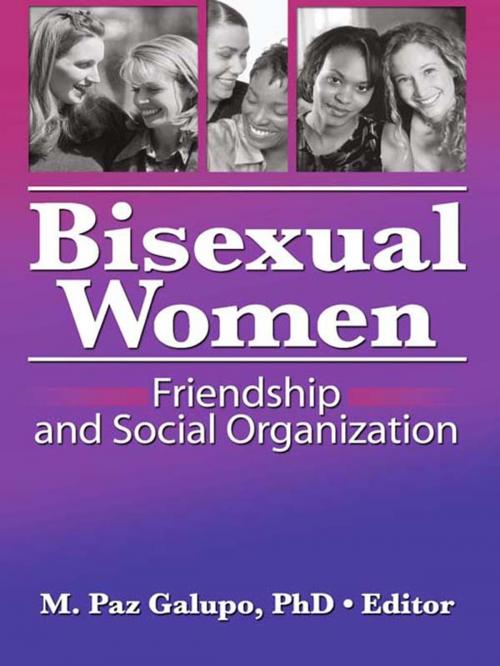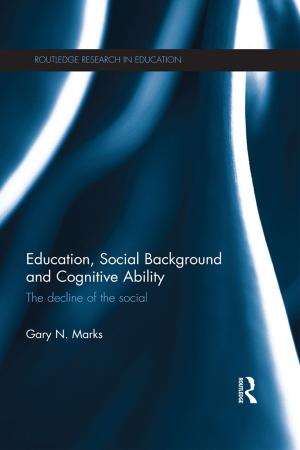Bisexual Women
Friendship and Social Organization
Nonfiction, Social & Cultural Studies, Social Science, Gender Studies, Gay Studies, Sociology| Author: | M Paz Galupo | ISBN: | 9781136577192 |
| Publisher: | Taylor and Francis | Publication: | March 7, 2013 |
| Imprint: | Routledge | Language: | English |
| Author: | M Paz Galupo |
| ISBN: | 9781136577192 |
| Publisher: | Taylor and Francis |
| Publication: | March 7, 2013 |
| Imprint: | Routledge |
| Language: | English |
Understand the unique emotional dynamics of bisexual women’s friendship relationships
Prevailing attitudes toward bisexuality affect every aspect of a bisexual woman’s emotional and sexual life. Bisexual Women: Friendship and Social Organization comprehensively explores the friendship relationships of bisexual women, and the ways that bisexuality shapes the friendship experience. This book fills a gap in the literature and research on bisexuality and friendship, presenting leading experts discussing the latest qualitative and quantitative studies on this rarely visited topic. This examination explains how the friendships of bisexual and bi-curious women can be affected by sexism, heterosexism, biphobia, and racism, as well as providing an insightful review of how bisexual women are portrayed in film and literature.
Bisexual and bi-curious women often have a more diverse range of friendship experiences than heterosexual women. Bisexual Women: Friendship and Social Organization presents studies and personal essays to provide a comprehensive understanding of the patterns of various friendship relationships that exist because of-and in spite of-prevalent social attitudes about bisexuality. This extensive look details various aspects of bisexual women’s relationships as well as society’s biases and preconceived notions. Analysis of research explores the various effects that being bisexual has on the way women approach friendship, as well as how society views both bisexuality and relationships.
Topics in Bisexual Women: Friendship and Social Organization include:
-
research into young women’s emerging sexual orientation identity
-
types of friendships formed by bisexual women
-
how friendship experiences are shaped by sociopolitical attitudes
-
bisexual images in popular media
-
critique of the bisexual women’s friendship literature
-
how heterosexism shapes platonic and erotic relationships
-
how bisexuality constricts social relationships
-
analysis of how sexual experiences influenced friendships
-
much more
Bisexual Women: Friendship and Social Organization is insightful, important reading for psychologists, counselors, LGBT studies professionals, educators, and students.
Understand the unique emotional dynamics of bisexual women’s friendship relationships
Prevailing attitudes toward bisexuality affect every aspect of a bisexual woman’s emotional and sexual life. Bisexual Women: Friendship and Social Organization comprehensively explores the friendship relationships of bisexual women, and the ways that bisexuality shapes the friendship experience. This book fills a gap in the literature and research on bisexuality and friendship, presenting leading experts discussing the latest qualitative and quantitative studies on this rarely visited topic. This examination explains how the friendships of bisexual and bi-curious women can be affected by sexism, heterosexism, biphobia, and racism, as well as providing an insightful review of how bisexual women are portrayed in film and literature.
Bisexual and bi-curious women often have a more diverse range of friendship experiences than heterosexual women. Bisexual Women: Friendship and Social Organization presents studies and personal essays to provide a comprehensive understanding of the patterns of various friendship relationships that exist because of-and in spite of-prevalent social attitudes about bisexuality. This extensive look details various aspects of bisexual women’s relationships as well as society’s biases and preconceived notions. Analysis of research explores the various effects that being bisexual has on the way women approach friendship, as well as how society views both bisexuality and relationships.
Topics in Bisexual Women: Friendship and Social Organization include:
-
research into young women’s emerging sexual orientation identity
-
types of friendships formed by bisexual women
-
how friendship experiences are shaped by sociopolitical attitudes
-
bisexual images in popular media
-
critique of the bisexual women’s friendship literature
-
how heterosexism shapes platonic and erotic relationships
-
how bisexuality constricts social relationships
-
analysis of how sexual experiences influenced friendships
-
much more
Bisexual Women: Friendship and Social Organization is insightful, important reading for psychologists, counselors, LGBT studies professionals, educators, and students.















